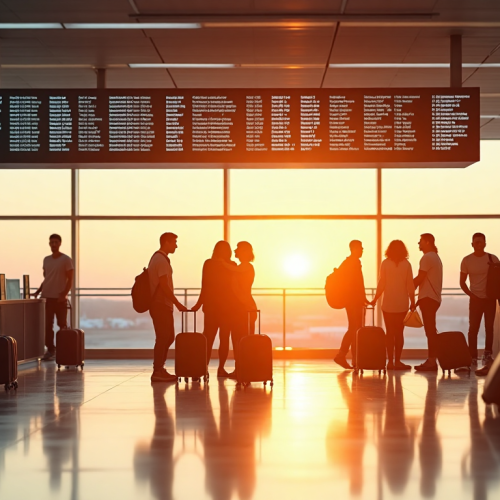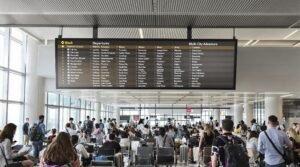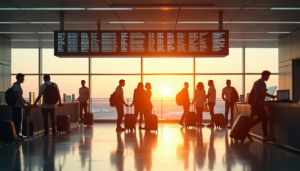International travel is making a serious comeback, and with it comes the challenge of stress-free flying. Here’s something that might surprise you. Booking your flight just three to four months in advance can save you up to 14 percent on airfare compared to last minute deals. Most travelers obsess over luggage and snacks, but the biggest secret is all about timing, preparation and making your health a top priority. Your next flight could feel a lot smoother than you think.
Table of Contents
- How To Plan For Your International Flight
- Smart Packing Tips For Long-Haul Travelers
- Saving Money On International Airfare In 2025
- Staying Comfortable And Healthy During The Flight
Quick Summary
| Takeaway | Explanation |
|---|---|
| Plan Ahead | Thoroughly prepare documentation, health checks, and packing strategies at least 4-6 weeks before departure to ensure a smooth travel experience. |
| Smart Packing Techniques | Use packing cubes, roll clothes, and include essential items in your carry-on for efficiency and comfort during long-haul flights. |
| Timing is Key for Savings | Book international flights 3-4 months in advance and be flexible with travel dates to take advantage of lower fares and discounts. |
| Stay Healthy During the Flight | Maintain hydration, move regularly, and consider nutrition to enhance comfort and health while traveling. |
| Use Technology for Cost Efficiency | Leverage price comparison tools, set up alerts, and explore budget airlines to find the best airfare deals. |
How to Plan for Your International Flight
Planning an international flight requires strategic preparation and attention to detail. Successful travelers understand that comprehensive planning can transform a potentially stressful journey into a smooth, enjoyable experience. The key lies in systematic preparation that covers everything from documentation to personal comfort.
Document Preparation and Verification
Documentation forms the foundation of international travel. Begin by checking your passport’s validity at least six months before departure. Many countries require passports to be valid for six months beyond your planned return date. Check your travel documentation requirements carefully to avoid last minute complications.
According to the Federal Aviation Administration, travelers should arrive at the airport three hours before international flights. This buffer allows sufficient time for check-in, security screening, and potential unexpected delays. Organize your travel documents in a dedicated travel wallet or folder, including:
- Passport (valid and undamaged)
- Visa documents (if required)
- Travel insurance information
- Vaccination records
- Printed and digital copies of essential documents
Health and Medical Considerations
International travel demands proactive health management. The Centers for Disease Control and Prevention recommends consulting healthcare providers 4-6 weeks before departure. This consultation helps you:
- Receive destination-specific vaccinations
- Discuss potential health risks
- Obtain necessary medical prescriptions
- Get advice on managing existing health conditions during travel
Long-haul flights pose unique health challenges. The CDC warns about increased risks of blood clots during extended flights. Travelers should:
- Move periodically during the flight
- Wear comfortable, loose clothing
- Stay hydrated
- Consider compression socks for improved circulation
Packing and Logistics Strategy
Effective packing goes beyond throwing clothes into a suitcase. Create a comprehensive packing list that considers your destination’s climate, cultural norms, and planned activities. Pack versatile clothing items that can be mixed and matched. Include essential items in your carry-on, such as medications, a change of clothes, and critical documents.
Technology and communication preparations are crucial. Ensure your mobile phone is unlocked and compatible with international networks. Research local SIM card options or international roaming plans. Pack universal power adapters and consider portable chargers to keep your devices operational throughout your journey.
Financial preparation is equally important. Notify your bank about international travel to prevent card freezes. Carry multiple payment methods, including credit cards, debit cards, and some local currency. Research exchange rates and consider getting a travel-friendly credit card with low international transaction fees.
By systematically addressing these key areas documentation, health, packing, and logistics you set the stage for a stress-free international travel experience. Remember, thorough preparation is the traveler’s most valuable passport.
Smart Packing Tips for Long-Haul Travelers
Long-haul travel demands a strategic approach to packing that balances comfort, efficiency, and practicality. Mastering the art of smart packing can transform your international journey from a potential logistical nightmare to a seamless travel experience. Understanding how to pack intelligently is crucial for reducing stress and maximizing enjoyment during extended trips.
Maximizing Luggage Efficiency
Effective packing begins with smart space management. According to travel experts, utilizing packing cubes and compression bags can revolutionize how you organize and transport your belongings. These innovative tools allow travelers to:
- Categorize items systematically
- Reduce clothing volume by removing excess air
- Minimize wrinkles and keep clothes neat
- Optimize luggage space more effectively
Expert recommendations suggest rolling clothes instead of traditional folding. This technique not only saves space but also keeps clothing in better condition. Multi-use clothing items are another game-changing strategy. Choose versatile pieces that can be mixed and matched, creating multiple outfits from fewer individual items. Learn more about travel-smart packing to streamline your travel wardrobe.
Essential Carry-On Strategy
Your carry-on bag is your travel lifeline during long-haul flights. Pack it strategically with items that ensure comfort and preparedness. Essential carry-on contents should include:
- Medications and personal health supplies
- Change of clothes
- Travel-sized toiletries
- Electronic chargers
- Important travel documents
- Lightweight entertainment (books, tablet, noise-canceling headphones)
Consider the climate and potential temperature variations during your journey. Layerable clothing allows you to adapt to changing environments. A lightweight jacket or versatile scarf can provide warmth on cold flights or serve as a makeshift blanket.
Technology and Comfort Considerations
Modern travelers rely heavily on technology, making smart electronic packing crucial. Invest in a universal power adapter compatible with multiple electrical systems. Portable chargers are essential for keeping devices operational during long flights and layovers. Consider bringing:
- Compact power bank
- Multiple charging cables
- Lightweight laptop or tablet
- Noise-canceling headphones
- International SIM card or portable Wi-Fi device
Comfort goes beyond physical items. Pack lightweight, moisture-wicking clothing that allows freedom of movement. Compression socks can help prevent leg swelling during extended flights. A small travel pillow and eye mask can dramatically improve your in-flight comfort and help you rest more effectively.
Smart packing is an art form that combines preparation, flexibility, and strategic thinking. By implementing these tips, long-haul travelers can reduce stress, maximize comfort, and focus on enjoying their international adventure. Remember, the goal is not just to pack efficiently, but to travel with ease and confidence.
Saving Money on International Airfare in 2025
Navigating the complex world of international airfare requires strategic planning and insider knowledge. Budget-conscious travelers can significantly reduce their travel expenses by understanding the nuanced dynamics of airline pricing and booking strategies. In 2025, smart travelers have more tools and techniques than ever to secure affordable international flights.
Timing Your Booking Strategically
Research from Forbes reveals that booking international flights three to four months in advance can yield the most competitive prices. Airlines typically increase fares substantially 28 days before departure, making early planning crucial. Explore advanced booking strategies to maximize your savings potential.
Timing extends beyond advance booking. According to Expedia’s travel analysis, departing on a Friday can save travelers up to 14% compared to more expensive weekend departures. Consider these timing strategies:
- Midweek departures often feature lower fares
- Avoid peak travel seasons
- Be flexible with travel dates
- Monitor price trends for your specific route
Leveraging Technology and Comparison Tools
Modern travelers have unprecedented access to price comparison technologies. Utilizing fare tracking applications and price alert systems can provide significant financial advantages. Key strategies include:
- Set up price alerts on multiple platforms
- Use incognito browser modes when searching
- Compare prices across different booking websites
- Consider budget airlines and alternative routes
- Look for promotional codes and student/senior discounts
Many travelers overlook the potential of credit card rewards and airline loyalty programs. Accumulating miles through strategic credit card use can dramatically reduce international travel expenses. Some premium travel credit cards offer:
- Sign-up bonuses
- Complimentary flight upgrades
- Free checked baggage
- Airport lounge access
- Travel insurance protections
Additional Money-Saving Techniques
Beyond booking strategies, savvy travelers can implement multiple approaches to reduce overall travel costs. Consider these advanced techniques:
- Multi-city routing: Sometimes booking flights with layovers can be cheaper
- Student and youth discounts: Many airlines offer reduced fares
- Off-peak travel: Fly during less popular times
- Currency exchange considerations: Book in local currencies for potential savings
- Package deals: Combining flights with accommodations can reduce total expenses
Successful budget travel requires a combination of research, flexibility, and strategic planning. By understanding market dynamics and leveraging available technologies, international travelers can significantly reduce their airfare expenses. Remember that saving money isn’t about cutting corners, but about making informed, intelligent travel decisions.
The key to affordable international travel in 2025 lies in proactive research, technological savvy, and a willingness to explore unconventional booking strategies. Your wallet will thank you for the extra effort.
To help visualize and compare the many ways to save on airfare discussed above, here’s a summary table of effective money-saving strategies and their core benefits:
| Money-Saving Strategy | Description | Key Benefit |
|---|---|---|
| Early Booking | Reserve flights 3–4 months ahead | Lower fares, up to 14% savings |
| Flexible Dates/Departures | Choose midweek or Friday departures | Increased chance of cheaper tickets |
| Fare Alerts & Comparison Tools | Track and compare prices on multiple platforms | Access to best available deals |
| Budget Airlines/Alternative Routes | Consider non-traditional airlines or multi-city routes | Additional cost savings |
| Loyalty Programs & Rewards | Use credit card bonuses and frequent flyer miles | Free/discounted flights, perks |
| Package/Bundle Deals | Combine flights with hotels or car rentals | Reduced total travel expenditures |
Staying Comfortable and Healthy During the Flight
International flights present unique challenges to passenger comfort and health. Navigating long hours in a confined space requires strategic planning and proactive self-care. Understanding how to maintain your physical and mental well-being during extended air travel can transform a potentially exhausting journey into a more pleasant experience.
Physical Comfort and Circulation
Medical research emphasizes the critical importance of movement during long-haul flights. Staying stationary for extended periods increases risks of deep vein thrombosis and overall physical discomfort. Travelers should implement active strategies to maintain circulation:
- Walk the cabin periodically
- Perform seated stretches
- Rotate ankles and flex leg muscles
- Use compression socks
- Choose aisle seats for easier movement
Experts recommend maintaining hydration as a crucial element of in-flight health. Aircraft cabins have extremely low humidity levels, which can rapidly dehydrate passengers. Drinking water consistently throughout the flight helps counteract these effects. Avoid alcohol and excessive caffeine, which can further contribute to dehydration.
Nutrition and Wellness Strategies
In-flight nutrition plays a significant role in maintaining comfort and energy levels. Select meals that are light, easily digestible, and provide sustained energy. Consider bringing healthy snacks like:
- Nuts and seeds
- Fresh fruit
- Protein bars
- Dried fruit
- Electrolyte packets
Travel wellness research highlights the importance of mental relaxation techniques. Deep breathing exercises, mindfulness practices, and strategic noise cancellation can significantly reduce flight-related stress. Consider bringing:
- Noise-canceling headphones
- Eye mask
- Small meditation or breathing guide
- Lightweight blanket or wrap
Managing In-Flight Wellness
Mental preparation is as crucial as physical comfort. Learn more about traveler wellness techniques to enhance your journey. Develop a personalized in-flight wellness kit that addresses your specific needs. This might include:
- Personal medications
- Moisturizer
- Lip balm
- Hand sanitizer
- Neck pillow
- Comfortable layers of clothing
Temperature regulation becomes important during long flights. Dress in layers that can be easily added or removed. Choose breathable fabrics that provide warmth without causing excessive sweating. Consider a lightweight jacket or wrap that can double as a blanket or pillow.
Sleep strategies can dramatically improve long-haul flight experiences. If possible, adjust your sleep schedule to your destination’s time zone before departure. During the flight, use natural sleep aids like:
- Melatonin supplements
- Herbal tea
- Relaxation audio tracks
- Minimal screen time before attempting sleep
Remember that every traveler’s body responds differently to flight conditions. What works perfectly for one person might not work for another. Experiment with different comfort strategies and develop a personalized approach that suits your individual needs.
Ultimately, staying comfortable and healthy during international flights is about proactive preparation, mindful self-care, and adaptability. By implementing these strategies, you can transform a potentially challenging journey into an opportunity for rest, relaxation, and personal well-being.
To make it easy to keep your in-flight comfort and health routines on track, here’s a checklist table of recommended actions and items for a comfortable and healthy flight:
| Action/Item | Purpose/Benefit | Checked? |
|---|---|---|
| Move/Stretch Regularly | Improves circulation & reduces DVT | |
| Stay Hydrated | Prevents dehydration | |
| Use Compression Socks | Minimizes swelling, DVT risk | |
| Healthy Snacks | Maintains energy, supports wellness | |
| Noise-Canceling Headphones | Enhances relaxation, reduces stress | |
| Neck Pillow & Eye Mask | Improves rest and sleep quality | |
| Moisturizer/Lip Balm | Addresses dry cabin conditions | |
| Dress in Comfortable Layers | Maintains temperature comfort |
Frequently Asked Questions
How far in advance should I book my international flight?
Booking your international flight 3 to 4 months in advance can save you up to 14% on airfare compared to last-minute deals.
What documents do I need to prepare for international travel?
You should prepare your passport, any required visa documents, travel insurance information, vaccination records, and printed and digital copies of essential documents.
What are some tips for staying comfortable during a long-haul flight?
Stay comfortable by moving around periodically, wearing compression socks, staying hydrated, and using noise-canceling headphones and a travel pillow for better rest.
How can I save money on international airfare?
To save money on international airfare, book flights early, be flexible with your travel dates, utilize fare tracking apps, and consider budget airlines or multi-city routing.
Ready For a Stress-Free International Journey?
Traveling abroad should feel exciting, not overwhelming. If you are tired of endless flight searches, confusing options, or the worry of missing out on the best airfare deals, VacationSpotter.com is here for you. The article you just explored shares how early booking, strategic packing, and smart planning can make your next trip easier, but actually finding and securing those perfect flights is often the hardest part.
Imagine booking the best, cheapest, and highest quality international flights, hotels, and transfers without any extra hassle. Take the stress out of travel planning by letting VacationSpotter.com do the searching for you. Let us help you save money, beat rising prices, and secure every detail for your next global adventure. Discover your ideal vacation and book with confidence today at https://vacationspotter.com. Experience what it feels like to travel smart and stress-free. Start your journey now before the next price hike or popular route is sold out.
Recommended
- 12 Must-Know Tips for First Time Flyers in 2025 – Vacationspotter.com
- 12 Must-Know Tips for First Time Flyers in 2025 – Vacationspotter.com
- How Early to Book Flights in 2025: Save More & Travel Smart – Vacationspotter.com
- Top Tips for Road Trips in 2025: Save, Explore, Enjoy – Vacationspotter.com
- Best Summer Travel Deals for 2025: Where to Go? – Vacationspotter.com
- Travel Itinerary Planning Made Easy: Smart Tips for 2025 Adventures – Vacationspotter.com








